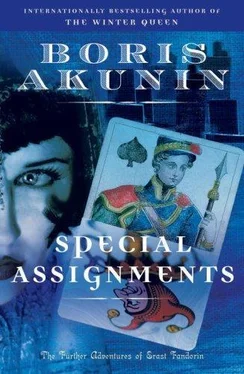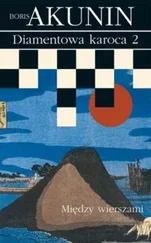Outside there was another shock in store for Tulipov. As he pulled on his gloves, the Court Counsellor suddenly asked him: 'Is it true what I've been told - that you support an invalid sister and have refused to give her into public care?'
Anisii had not expected such detailed knowledge of his domestic circumstances, but in his stunned condition, he was less surprised than he ought to have been. 'She can't go into public care,' he explained. 'She'd pine away. The poor simpleton is far too used to me.'
That was when Fandorin really astounded him. 'I envy you,' he sighed. 'You're a fortunate man, Tulipov. At such a young age you already have reason to respect yourself - something you can be proud of. The Lord has given you a firm core for the whole of your life.'
Anisii was still trying to grasp the meaning of these strange words when the Court Counsellor continued: 'Do not be concerned about your sister. Hire a nurse for her for the period of the investigation. At public expense, naturally. From this moment on until the case of the Jack of Spades is closed you will be at my disposal. We shall be working together for a while. I hope you won't find it too b-boring.'
This was his unexpected happiness, Tulipov suddenly realised. This was his good fortune.
Praise be for the white dove!
CHAPTER 2
The Science of Life According to Momos
In recent years he had changed his name so often that he had almost forgotten the original one, the one he had been born with. And in his own mind he had long since referred to himself as 'Momos'.
Momos is the name of a spiteful ancient Greek jester, the son of Nyx, the goddess of night. In a prophecy of the 'Egyptian Pythia', the same name is given to the jack of spades, a bad card that promises a meeting with a scoffing fool or a malicious trick of fortune.
Momos was fond of cards and even had a profound respect for them, but he didn't believe in fortune-telling and the meaning he invested in his chosen name was quite different.
It is well known that every mortal plays a game of cards with destiny. The cards that are dealt do not depend on man; you have to take what you are given: some will get nothing but trumps, others nothing but twos and threes. Nature had dealt Momos middling cards - rubbish, you could say: tens and jacks. But a good player will make a fight of it even with cards like that.
In terms of the human hierarchy, too, it was the jack that suited him best. Momos's assessment of himself was a sober one: he was no ace, of course, and no king, but he was no worthless card either. So he was a jack. But not some boring old jack of clubs or respectable jack of diamonds or - God forbid -sentimental, drooling jack of hearts, but a special jack, the jack of spades. Spades were a complex suit, the most junior suit in all the games except for bridge, in which they outranked clubs and hearts and diamonds. The conclusion was: decide for yourself what game you are going to play with life, and your suit will be the main one.
In his early childhood Momos had been obsessed by the Russian saying about chasing two hares at once. Why, he used to wonder in bewilderment, was it not possible to catch both of them? Did you just have to abandon one of them, then? Little Momos (he wasn't Momos yet; he was still Mitenka Sawin) definitely did not agree with that. And he had turned out to be absolutely right. The saying had proved to be a stupid one, designed for the dull-witted and lazy. On occasions Momos had managed to catch not just one or two long-eared, fluffy grey animals at once, but many of them. For that he had his own psychological theory, which he had developed specially.
People had invented many sciences, and most of them were of no benefit to a normal man, but they carried on writing treatises, defending their master's and doctoral dissertations, becoming members of academies. Ever since he was very little, Momos had been able to sense with his very skin, his bones, his spleen that the most important branch of learning was not arithmetic or Latin, but the ability to please. That was the key with which it was possible to open any door. It was strange, though, that this most important knowledge was never imparted by tutors or grammar-school teachers. He had had to discover its laws for himself. But if you thought about it for a moment, that was actually to his advantage. The boy had shown a talent for this most important branch of learning early on, and he could only thank God that others were unaware of the advantages of this discipline.
For some reason ordinary people failed to pay this crucial activity the serious attention it deserved. They thought: If someone likes me, that's good; if they don't, then that's just too bad - you can't force anyone to like you. Oh yes, you can, Mitenka thought as he grew up, you certainly can. And once you've made someone like you, managed to find the key that fits him, that person is yours to do with as you like.
It turned out that you could make anyone like you, and very little was required to do it - just to understand what kind of person they were, how they saw the world, what they were afraid of. And once you'd understood that, you could play them like a reed pipe, and choose your own melody. A serenade if you liked, or a polka.
Nine out of ten people would tell you everything about themselves if you were just willing to listen. The astounding thing was that nobody listened to anybody else properly. In the best case, if people were well brought up, they would wait for a pause in the conversation before mounting their own hobbyhorse again. But you could find out so many important and interesting things if you just knew how to listen!
Listening properly was a kind of art. You had to imagine that you were an empty bottle, a transparent vessel connected with the person you were talking to via an invisible tube, and let the contents of the other person flow into you a drop at a time, so that you were filled with liquid that was the same colour and strength, the same composition - to stop being yourself for a while and become him. And then you would come to understand that person's essential being, and you would know in advance what he was going to say and what he was going to do.
Momos mastered his science gradually and in his early years he applied it in a small way, for limited gain, but mostly for purposes of checking and experimenting: to obtain a good mark at his grammar school without having learned the lesson; then later, at military school, to win the respect and affection of his comrades; to make a girl fall in love with him.
Later, when he had joined the regiment and his skill and control had grown rather more sure, the benefits that it brought became more significant. For instance, you could clean out a man with money at cards, and he would sit there calmly and not take offence at this fine young chap, the Cornet Mitya Sawin. And he wouldn't stare at your hands any more than necessary. That was not bad, surely?
But all this had only been gymnastic exercises for developing the muscles. His knowledge and talent had come in genuinely useful six years earlier, when destiny had offered the future Momos his first real Chance. He hadn't yet known at that time that a Chance ought not to be fished for, but created. He had kept waiting for good fortune to swim into his hands of its own accord, and the only thing he had been afraid of was that he might let it slip. He hadn't.
At the time things in general were looking pretty mouldy for the young cornet. The regiment had been stationed in the provincial city of Smolensk for more than a year, and every opportunity to apply his talents had already been exhausted. He had won money at cards from everyone he could; everything he could borrow had been borrowed long ago; the colonel's wife loved Mitya with all her heart, but she was tight-fisted with money, and her jealousy exhausted him. And then there was his little slip with the remount money: Cornet Sawin had been sent to the horse fair at Torzhok, where he had got quite carried away and spent more than was permitted.
Читать дальше











